|
Waltee Douglas is a very active retiree. In fact, she is probably as
busy now as she was during her professional life. In both lives,
she has worked with countless people helping them to actualize
their potential. Waltee is an inspiration to all of us to do as
much as possible to help others overcome setbacks of life.
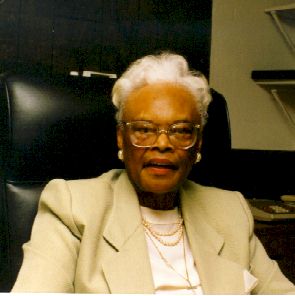 Al: Would you give my readers and me some background on your family?
Where were you born and how did you wind up in Gary, IN?
Al: Would you give my readers and me some background on your family?
Where were you born and how did you wind up in Gary, IN?
Waltee:
I was born in Sunflower County, MS. That's where I spent my early
years. I moved to Marion, OH, when I was in the ninth grade. I
skipped around a lot from then on. You have to remember that back
then the school year was short due to the farming demands in the
South. I moved to Marion with my uncle. Then off I went to Kansas
City to live with my aunt for the tenth grade. I lived with
another aunt in the eleventh grade and with a cousin in the
twelfth grade. I finally came to Chicago after high school and
got married. I started my family and had four children. I had
been working for the Department of Agriculture and had gone as
far as I could without a college education. At that time, about
all that a woman could do was to become a nurse, a teacher, or a
domestic. So, I started to school at Roosevelt University in
Chicago and majored in elementary education. I became a teacher
here in Gary in 1963. During that time, I also got my masters
degree.
Al: How long did you work in the Gary schools?
Waltee:
I was in the Gary schools for thirteen years before I went to
Purdue-Calumet. Between Gary and Purdue, I went to
Purdue-Lafayette for two years where I finished up my work on a
Ph.D. Then I came back to Gary and worked there for a year and a
half before going to the Hammond School Corporation for a short
while where I served as the affirmative-action officer. Then I
went to Purdue. I had already been an adjunct staff person since
1974, but I was full-time at Purdue from 1977 to 1997.
Al: What were your responsibilities at Purdue?
Waltee:
I was the director of the counseling center and staff
psychologist. I also taught counseling and group-process classes.
In addition, I led workshops and seminars that were designed to
enhance human growth and development. I did a lot of enhancement
classes to assist students in completing their work at Purdue.
Al: What are you doing with your time now that you are retired from
Purdue?
Waltee: I work at the First Baptist Church and also here at the
Corinthian Christian Center.
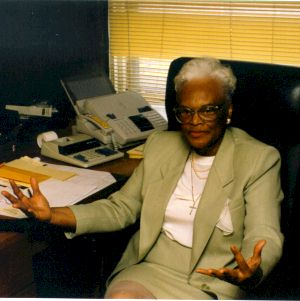 Al: Tell me about the Corinthian Christian Center?
Al: Tell me about the Corinthian Christian Center?
Waltee:
It is a treatment facility for the elderly who have drug or
alcohol problems. There are a couple of reasons why the elderly
have problems with the use and misuse of drugs. One reason is
that they are taking so many different medications. Sometimes, they
just need someone making sure they are taking the right
medication in the way prescribed by their doctor. We help them
manage their medications. However, one of our other objectives is
help treat those elderly that do drugs or have a drinking
problem.
Al: You
have a good size staff at the Corinthian Christian Center: a
medical director, nurse, psychologist, social worker, and an
addictions counselor.
Waltee: We do, but we are still looking for an additional staff person-a
clinical social worker.
Al: How many clients do you see each week?
Waltee: That varies from week to week. Our goal is to see forty-four
people weekly. It ranges from as little as fifteen to as many as
eighty-eight. In addition, we have some homebound clients. The
ages vary greatly also-from fifty-five to one hundred and five.
Presently, our oldest client is ninety-eight.
Al: You are also an ordained pastor.
Waltee:
That's right. I run an employment enhancement program at First
Baptist here in Gary. I provided the counseling necessary for
young people to find employment. In addition, many of the
unemployed have substance problems. We are attempting to develop
a program for them in addition to helping them find employment.
Our goal is to get all them to the point where they can find a
job and keep it.
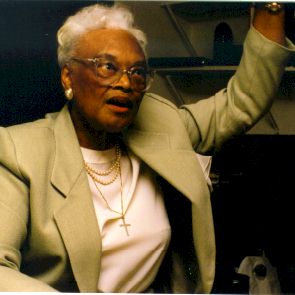 Al: You have both a secular and religious academic background. How do
they interface?
Al: You have both a secular and religious academic background. How do
they interface?
Waltee: That
was one of my primary reasons for going to seminary. I wanted to
be able to interface the two backgrounds. One of my students at
Purdue wanted me to come to her class and talk about the
psychopathology found in the Bible. I thought about it for
awhile. There are many examples from both the Old and New
Testaments of pathology along with treatment. I use the cognitive
behavior model in my counseling practice-the way you think is the
way you are. Therefore, if you can change how you think, you can
change how you are. I think that is also one of the biblical
models. One of my goals at seminary was to translate
psychological terms into theological ones. My theological
training has allowed me to integrate the two.
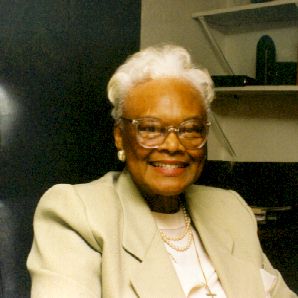 Al: How do you separate the two when working in a secular agency?
Al: How do you separate the two when working in a secular agency?
Waltee:
Although people are spiritual beings, I can deal with them at the
psychological level without bringing theology or religion into
the treatment plan. However, if they open the door for me to
their spiritual side, then I will go into that spiritual
arena-when invited. My perspective is from the holistic approach:
mind, body, and spirit. When I am at my church, there is no
problem with integrating the psychological with the theological.
Al: You are one of the most active retired persons that I have ever met.
I had a hard time reaching you to set up this interview. You were
in France when I first called. What were you doing in France?
Waltee: Walking.
Al: Walking?
Waltee:
Yes, walking all over France. I have an interesting life. I am
always interfacing with so many different people. One of the
persons that worked with me in the counseling center at Purdue
belonged to the walking group at the university. She told me that
her walking group was going to England and that they had one more
slot open. She asked whether I wanted to go. And I went-that was
last year. This year we went to France. The athletic director at
Purdue, John Friends, was our guide and organizer. We spent two
days in Paris, then we went to southern France. We walked about
five to ten miles per day-we walk all over. Sometimes we were on
the roads and other times we would walk on paths through farms.
John guided us on both our tours. He was a lot of fun. He is also
an ex-Marine. So, he'd get us up early and off we'd go.
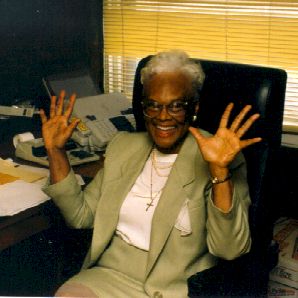 Al: Where else have you traveled?
Al: Where else have you traveled?
Waltee:
I have traveled a lot. My daughter who lives in California along
with twenty of her friends went to Seoul, Korea for a shopping
tour and finished up in Hong Kong. So, I went along. I have also
gone to the Holy Lands twice. While on both tours, I baptized a
number of people in the Jordan River.
Al: Isn't being a Baptist and an ordained woman very difficult?
Waltee:
Well, they don't ordain women. So, I went to the Methodist church
and was appointed to a church in Elkhart, IN, for two-and-a-half
years. While I was in Elkhart, I had the opportunity to go to
South Africa twice. I have been very lucky to be able to do all
this traveling. Whenever someone says, "Let's go," I
try to find the money necessary for the trip.
Al: You mentioned your daughter in California. How many children do
you have?
Waltee:
I have four children. Two of them are in California. One of my
sons does computer planning, the another is an attorney, and one
is a retired engineer. I started my family young. I was sixteen.
Al: If you had to write your epitaph, what would you want it to say?
How do you want to be remembered?
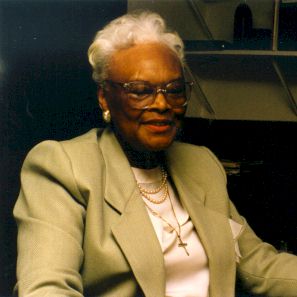 Waltee:
If I can help someone, then my life had a purpose. It gives me a
great deal of satisfaction when I see people that I had helped or
taught when they were young doing well in life. Because of this,
I feel that my life hasn't been in vain.
Waltee:
If I can help someone, then my life had a purpose. It gives me a
great deal of satisfaction when I see people that I had helped or
taught when they were young doing well in life. Because of this,
I feel that my life hasn't been in vain.
When
we were in France, I heard the song, "I Believe That I Can
Fly". I can help people to fly. I can help people discover
their best selves and achieve their goals.
Also,
my mother is in a nursing home with Alzheimer's Disease. My
commitment to helping other is dedicated to her. She has been in
a nursing home for a dozen years. If I can help someone stay with
their family longer, then it makes me feel good inside. I have
dedicated my life to my mother.
Al: What else are you working on now?
Waltee: The Baptist pastors still do not allow women into their alliance.
I want to be a part of that religious organization. But right
now, they won't let me join.
Al: Why not?
WaItee: Because, I am a woman. I tried. I applied, and they have turned
down.
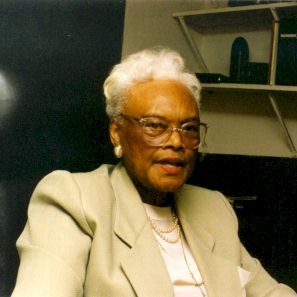 Al: What are you going to do?
Al: What are you going to do?
Waltee: I'm
going to take it to the NAACP and see whether they can help me.
We had a test case just a month ago. That was when they turned me
down. A young colleague and I want one Tuesday morning to join
the organization. If they took him and not me, then they are
discriminating against me because I'm a woman. After a lot of
discussions, they decided that they didn't want a woman in their
group.
Al: Because of what?
Waltee:
They said that there were things that they do that wouldn't be
appropriate for a woman. I asked whether those things would
offend Christ? They really didn't give me an answer. I guess then
that we are going to have to test that decision. I am old enough
that I can't lose anything. We are going to find out whether or
not they can discriminate against me. I see it as gender
discrimination. My pastor says that he will support me in any way
that we choose to deal with this. I haven't had a chance to do
anything about this since I got back from France, but we will
pursue it. We need to find out whether a religious organization
can discriminate against me based on my gender. My feeling is
that no one has the right to keep someone from her calling. This
is 1998. These barriers are archaic.
Al: Sometimes, I think that we have come really far, but with this issue, I wonder.
Waltee: We have
come far but not far enough. There are no Baptist women in this
area pastoring a church. Things are going to have to change.
Al: Let's hope so.
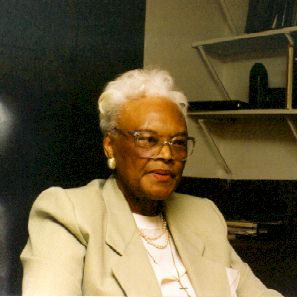
4/98
|







 Al: Would you give my readers and me some background on your family?
Where were you born and how did you wind up in Gary, IN?
Al: Would you give my readers and me some background on your family?
Where were you born and how did you wind up in Gary, IN? Al: Tell me about the Corinthian Christian Center?
Al: Tell me about the Corinthian Christian Center? Al: You have both a secular and religious academic background. How do
they interface?
Al: You have both a secular and religious academic background. How do
they interface? Al: How do you separate the two when working in a secular agency?
Al: How do you separate the two when working in a secular agency? Al: Where else have you traveled?
Al: Where else have you traveled? Waltee:
If I can help someone, then my life had a purpose. It gives me a
great deal of satisfaction when I see people that I had helped or
taught when they were young doing well in life. Because of this,
I feel that my life hasn't been in vain.
Waltee:
If I can help someone, then my life had a purpose. It gives me a
great deal of satisfaction when I see people that I had helped or
taught when they were young doing well in life. Because of this,
I feel that my life hasn't been in vain. Al: What are you going to do?
Al: What are you going to do?